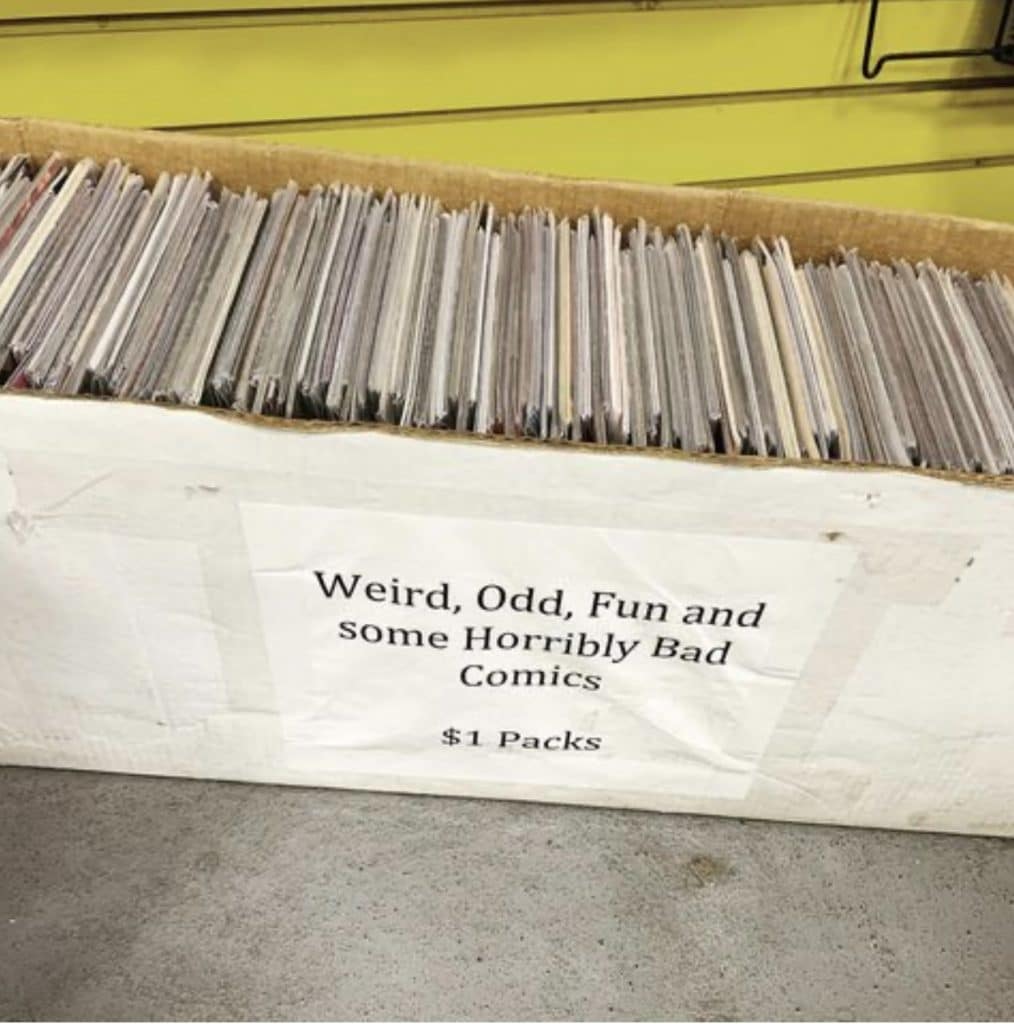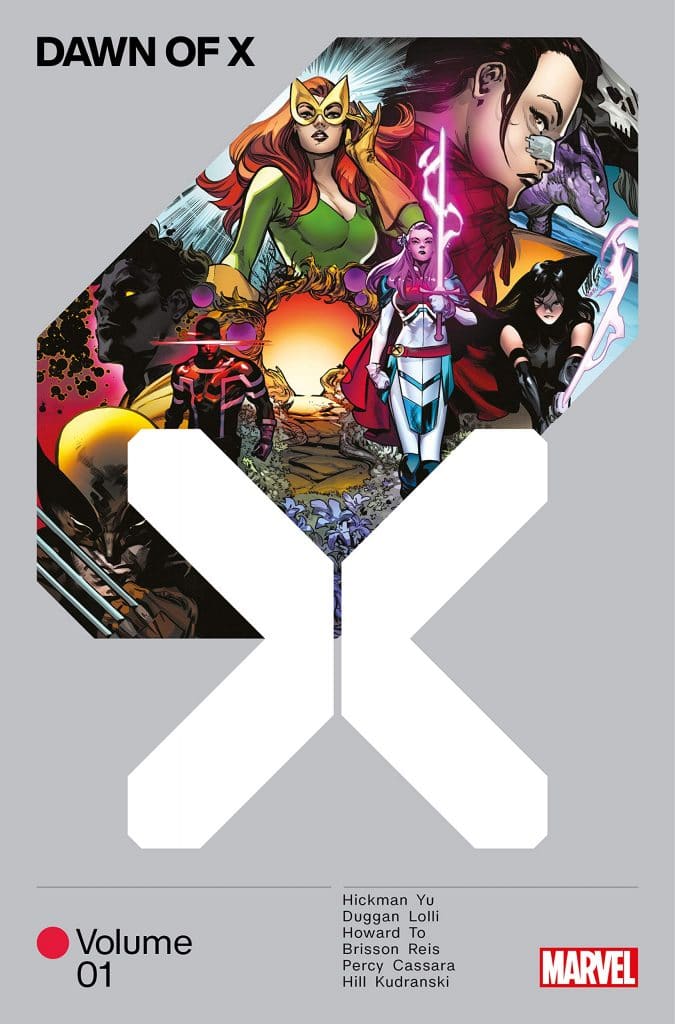2020 was a weird year that lasted a decade. Pertinent to nerds, the comic book industry was entirely disrupted, just as so many other industries were.
Shops closed. Publishing was paused. Distribution was halted.
Below are some of the trends that resulted. Okay, maybe the word “trend” won’t hold for all of them. It’s just a word from the headline, after all, and some of these may instead be temporary blips as a result of COVID. But some may indeed represent long-lasting trends. Either way, they were interesting developments in the comic book industry.
Marvel Comics Wore Bellbottoms
Firstly, the number of titles decreased, a trend that we’ll look at in a moment. But the titles that were published often had a distinctive throwback flavor to them in some interesting ways.
Marvel Comics was genre-heavy, cosmic-trippy, and IP-curious in the 70s and into the 80s. Genres like kung-fu and horror were popular in the 70s, so Marvel published titles like Master of Kung-Fu and Dracula in order to capitalize on those trends.
LSD was evidently popular among the writers at Marvel during that time, so Doctor Strange was never stranger. And classic Marvel cosmic tales like Kree/Skrull War were also told during that era.
Lastly, Marvel was open to publisher titles of popular IPs. Star Wars obviously, then Micronauts, ROM, and others, ultimately coming to Transformers and GI Joe in the 80s.
Marvel Comics of 2020 had an element of nostalgia for that era. To be clear, I’m not accusing contemporary Marvel creators of dropping acid, but there has been a notable imagination across Marvel, most notable in Marvel X-Men properties.
Marvel in 2020 was also eager to explore popular genres, this time with Manga and The Rise of Ultraman, Swordmaster, and Aero. Master of Kung-Fu is back as well.
Finally, Marvel has leaned into IP comics of late. Sure, there is Star Wars again but the big news was that Warhammer 40K is getting the Marvel treatment.
Less is More
Another comic book trend in 2020 was the fact that fewer overall titles were published, this due to the delays created by COVID. Outside of a handful of DC titles, zero comics hit shops in April and May wasn’t flush either.
But output was lower even in August. Marvel Comics released 65 comic issues in August 2020, compared to 88 in August 2019, a decrease of 26%. DC released 49 in August 2020, compared to 64 issues in August 2019, a decrease of 23%.
We’ve written about this before, but fewer titles being published each month could be a good thing if it turns into a trend. There was a glut of titles before COVID shook the industry, each of them competing for dollars and shelf space. The reality is there were so many titles to choose from that a third of those titles could be cut and almost no one will notice. Cover price increases meant most comic readers can’t afford to buy a tenth of the comics they wanted to anyway, so removing the fluff from their options will actually be a relief.
Dawn of X Trades
Much has been said about the X-Men era under Jonathan Hickman, but I haven’t heard a peep about Marvel’s strategy in collecting those X-Men titles into trade format.
Firstly, readers have been slowly drifting from floppies to trades for a while now. As a result, titles are written in decompressed 5- or 6-issue arcs that are perfect for trade collection. For example, Wolverine issues 1-6 would be collected into trade vol. #1 and issues 7-12 would be collected into vol. #2. You know how this works.
But what do you do when the story is interconnected between several different X-Men titles. Sure, the titles are independent of one another but there are shared threads and a reader wants to know what happens with their other favorite mutants anyway.
Well, Marvel has been producing the Dawn of X trades. Instead of collecting, for example, issues 1-6 of X-Men, Dawn of X volume 1 collects X-MEN #1, X-FORCE #1, MARAUDERS #1, EXCALIBUR #1, FALLEN ANGELS #1 and NEW MUTANTS #1.
In other words, Dawn of X collects the X-Men in a much more relevant and reader friendly way. Readers get the brand story collected, rather than simply the sequential issues of one title.
Better, each volume of Dawn of X accounts for the pace of the story. So, if the overall story dictates that 2 issues of a particular title (or sometimes zero issues) works best for that volume of Dawn of X, so be it.
Marvel is committed to crossovers, to say the least. The way the Dawn of X trades accounts for characters and storylines intersecting among titles is very reader- and story-friendly. Man, I hope this is a trend we see more of.
(Try the first volume of Dawn of X.)
Resilient Retailers
An experience I had at my Friendly Local Game Shop (FLGS) a couple of years ago has stuck with me. Another patron was complaining about what was literally the pettiest thing you could think of. As emotionally unhealthy people are wont to be, he was taking his frustrations out on the store employee who, to the employee’s credit, was remaining very patient and polite.
I mean, the Baloney-Meter was going off hard-core on this guy, which is not to be confused with Nerds on Earth’s Bologna-Meter, the former detects entitled phony-baloney nonsense, while the latter detects processed meats. Both are handy.
A product was delayed, myyyyy gaaaaaawd, so thanks for NOTHING, Pope Gregory XIII. A delayed product is an event that the patient store employee obviously has zero control over, yet you should have heard the sighs and moans come off of Baloney Bro. It’s like someone put a Kroger Value-brand maraschino cherry in his expensive bourbon cocktail and he was having none of it.
He then started spouting a bunch of off-the-shelf anti-establishment jargon like “cash grab,” “and this place doesn’t care about its customers.” That’s right, a small business that sells comic book back issues and plastic elf miniatures is too corporate for Baloney Bro!
Listen, I don’t know the employees of your Friendly Local Game Shop (FLGS). But I like to think the best of people, so I’m assuming he or she is aligned at least chaotic neutral and likely falls in the good domain. And the employee who had to put up with the above-mentioned chucklehead? He’s a lawful good hero.
I share this because small business ownership is a tough gig even before COVID and literally every product in 2020 was delayed. Yet the darnedest thing happened. The good-aligned shoppers rallied and supported their shops, many of which were hustling to set up online webstores and/or curbside pickup.
And shop owners performed like doggone superheroes, pivoting immediately to do whatever they could to stay open. Game and comic shops are so valuable to us nerds. I’m so thankful that so many roll a nat 20 on their constitution check and survived 2020.
Back Issues are Back
Another trend in the comic book industry is the renewed interest in back issues. With the proliferation of superheroes in the wider culture, many folks are burying their heads in back issue bins in order to have an issue or two that features their favorite characters, like a back issue from Captain America for example.
And it’s not just the gen pop who are digging into back issue bins. Long time collectors are fueling the trend as well. This is largely fueled by the Key Collector app, which I wrote about here.

Distribution Disruption
These last two trends are the biggies. From around the time that Dazzler helped birth life to comic book shops, Diamond Distributors has been the go-to (and usually only) distributor. And they’ve faithfully delivered untold millions of comics to shops for 4 decades.
But COVID shut them down, like entirely and almost immediately. It was like a switch simply turned off and shops who are reliant on Wednesday customers suddenly had no product and no customers, as they were sheltering at home.
DC Comics wasted no time in breaking their agreement with Diamond in order to bypass them by forging relationships with two upstart distributors, Lunar and UCS.
To make the pill even more bitter, Lunar and UCS were newly incorporated holding companies for Midtown Comics and Discount Comic Book Service (DCBS), respectively. Midtown and DCBS are essentially distributors themselves but they focus on the likes of eBay resellers. So, in transitioning away from Diamond toward eBay resellers DC Comics sent a chill to brick & mortar comic shops that were closed due to COVID.
The titles DC Comics first distributed through Lunar and UCS were Daphne Byrne #4, The Dreaming #20, and Batman Giant #4, along with reprints of Batman #89 and Nightwing #70. Those junk titles suggested they were just trying to dump undesirable product through the pipeline, which doesn’t ultimately serve comic shops, nor readers.
In short, the disruption from COVID was quickly joined by a disruption in the business fundamentals that had served comic shops for 4 decades. And it certainly not settled yet, even as Diamond is rolling again.
DCeased
To close this, let’s talk more about DC Comics. Their current event is a title called DCeased, which is ironic because those of us who follow the industry are genuinely wondering if DC plans to be in business in the near future.
The company is undergoing an implosion. Dan DiDio was still co-publisher at DC in 2020 and parent company AT&T was hyping its upcoming 5G initiative. But a massive restructuring followed and DC Comics lost most of its experienced staff.
It was so shocking that co-publisher Jim Lee gave an interview where he said, “I don’t think [AT&T] wants us to stop publishing comics,” an ominous statement if there ever was one. Dropped jaws weren’t even closed before management busted out even more pink slips that cleared out the remaining staff with direct market (comic shop) experience.
Does parent company AT&T even care about floppy little comic books when their Direct TV purchase was a flop and the ramp up of HBO Max is being dwarfed by Disney+, especially when they can keep their character IP alive by producing a limited number of trades that go straight to retailers like WalMart and Barnes & Noble, bypassing comic book shops altogether?
I guess we’ll find out in 2021, provided our Republic holds.
Sources
- August 2020 Numbers: ICv2
- The Value of a Game Shop
- Yeah, The Comic Book Industry Is Sick, But The Rumors Of Its Demise Are Exaggerated
- COMIC INDUSTRY FORECASTS FOR 2021: Rob Salkowitz
- Marvel Comics Stands At A Fork In The Road
- How I Learned to Love Collecting Comics Again
- How a Disco Singer Created Comic Book Shops
- Big News for the Comic Book Industry


